“The American Society of Magical Negroes” Writer/Director Kobi Libii Puts a Spell on Old Tropes
The American Society of Magical Negroes has a provocative premise: What if Black people could join an underground league that gave them the power to erase any white person’s distress? Racism, the movie argues, stems from white anxieties. If that discomfort can be vanished, Black bodies won’t face as much risk.
Kobi Libii’s satirical take on racial dynamics is a bold swing, especially for a first-time director. Justice Smith plays Aren, an overly polite 27-year-old Los Angeles artist who makes yarn sculptures but can’t muster the confidence to explain what they mean to potential buyers. When a bartender (David Alan Grier) notices a white gallery patron mistaking him for a server, he introduces Aren to the eponymous group. Aren’s new powers give him both self-esteem and a keener understanding of the world, which comes in handy when he takes a job at a social media giant that doesn’t live up to its inclusive ideals.
Libii, who developed the script with Smith at the Sundance Institute lab, is mocking the “magical negro” trope wherein Black characters are on hand solely to aid a white protagonist’s story, sometimes in fantastical ways. It’s long been a Hollywood fixture, as evidenced by Sidney Poitier in Lilies of the Field, Cuba Gooding Jr. in What Dreams May Come, Michael Clarke Duncan in The Green Mile, Will Smith in The Legend of Bagger Vance, and Mahershala Ali in Green Book. Here, Libii — best known for his roles on Madam Secretary and Transparent — explains his thinking behind The American Society of Magical Negroes.
Beyond the trope referenced in the title, how would you identify the central idea you were working through with this movie?
I was working through a very particular defense mechanism. I was taught as a Black man about how to survive in America, quite specifically that I needed to, in certain situations, be accommodating to white people to stay safe. There was a specific conversation with my father about needing to be polite to the cops. Essentially, I overlearned those lessons, so that specific defense mechanism is what I’m drilling down to explore. I think a lot of people who feel othered or pressured to assimilate in one way or another can identify with it. I want to tell the story of someone trying to do the hard internal work of unlearning that — and I also wanted to use magic.
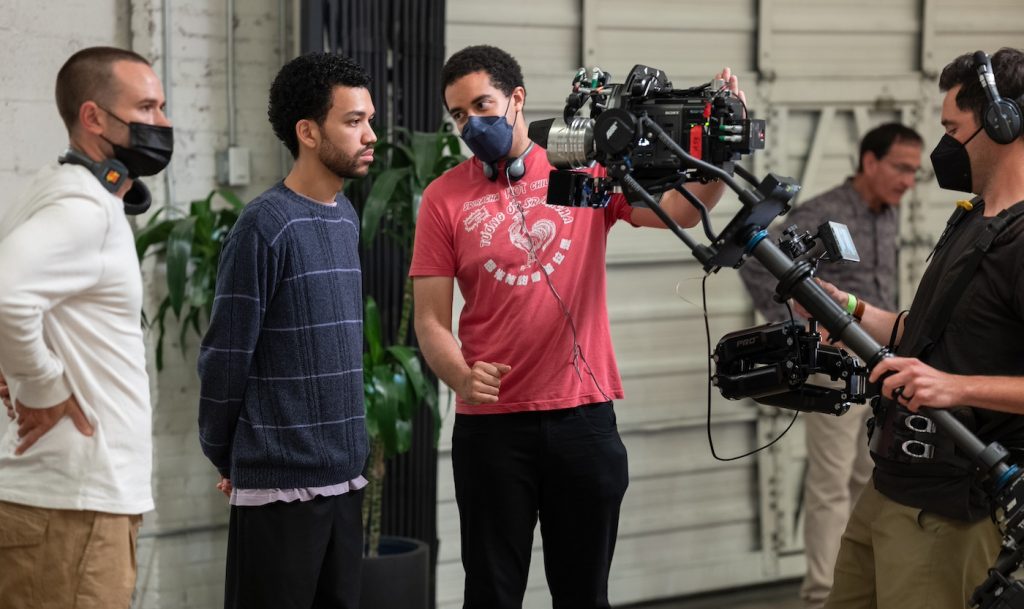
What is your relationship to the storytelling trope that you’re playing with?
I grew up in the ’90s. I watched a run of these movies and they always bothered me, but I didn’t really know why because I was too young to really understand the racial subtext. They were Oscar-nominated and they were lauded, and so there was a real juxtaposition between what I was being told these movies were and what I was experiencing them as. I found the characters so silly, but we were asked to treat them quite earnestly. When I grew up and heard the term, I was like, “Oh, okay, got it. This is what agitated me.” In some ways, it was less about the trope and more about what it’s like to grow up in an America that uses the trope over and over again.
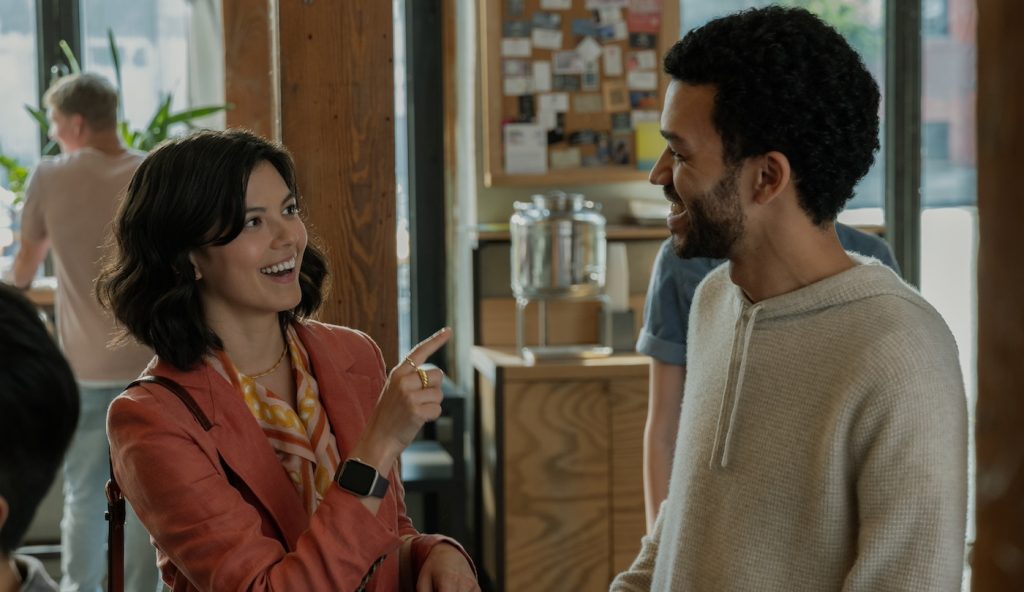
Something the movie left me wondering is whether there’s a version of this society in other countries. Or are the dynamics, as they relate to the movie, distinctly American?
It’s the only country I’ve ever lived in. I’m aware academically and through friends how some of these dynamics are similar to racialized dynamics in other countries, but I do think there are uniquely American qualities to it. There is a real American self-mythology around our own greatness and perfection as a nation, and that makes it incredibly hard to reckon with our sins. There’s an idea, especially in a lot of white people’s minds, that America is the greatest country on Earth. I think that contributes to some of the broken dialogue around this.
Where did the idea of a yarn artist come from?
Shout-out to textiles. I wanted him to be an artist for a couple of reasons — partially because it’s a vehicle for subjective confidence. If part of his journey is learning to take up more space in the world, it’s just such a good vessel: Is this thing you made worth anything? You have to tell us with your confidence. There’s no objective worth or value to a yarn sculpture, so it’s a really clear way for him to demonstrate the absence of that confidence at the beginning and then that growth at the end. Beyond that, he’s such a gentle character. The film is about protagonism — who we’ve centered and who we’ve pushed to the background. One thing I love about this character is that he’s a gentle Black man. A lot of the archetypal pressure I feel as a Black man is to be strong and indomitable and masculine in a traditional way. To me, that medium is a reflection of this quality of his that I wanted to center.
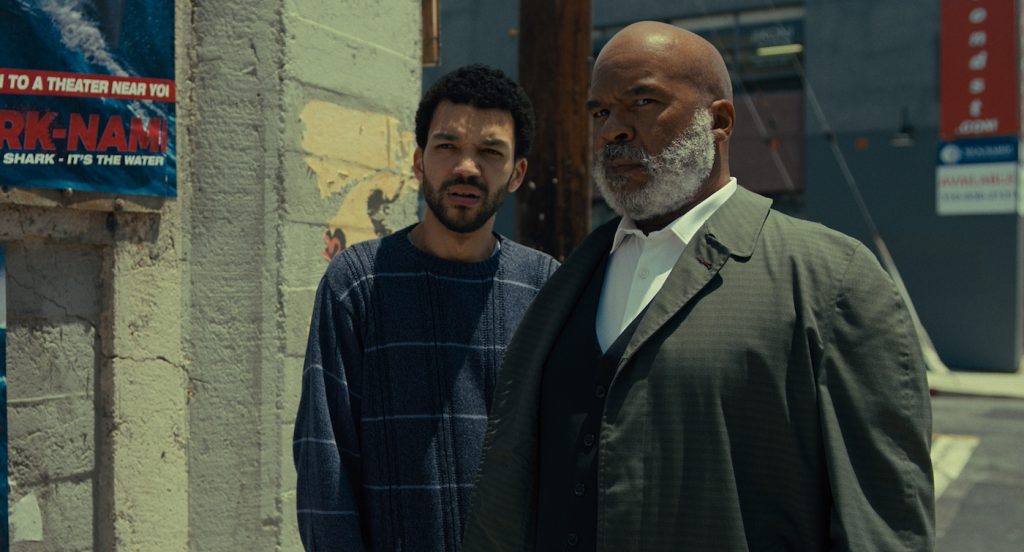
Which is interesting because most magical-Black-person characters tend to be gentle, too.
We ended up cutting some of this stuff because it was me going off on the magical-negro trope, but they’re pointedly desexualized. Or they’re sexualized in ways that are available to white people for their convenience and in no other way. There’s nothing sexual about Bagger Vance. With the character in The Green Mile, there’s a weird sexual thing that happens, but part of the fantasy on the part of white writers is that they’re taking the good parts of the neighborhood but not the bad. They’re taking all of the soul but none of the emasculation that comes from being a white writer imagining the archetype of a Black man. With Aren, he has a sexual charisma. This is, to me, a man whose strength is in his sensitivity.
Once you devised the idea of this secret society, how did you build out the rules and the powers its members would embody?
I have a big mythology doc that just me and my production designer will ever see about the rules of the world. It’s not a really heavy mythological world with intricate magic that you need to understand to appreciate the film. It’s metaphorical and hyperbolic, so almost everything is working backward from the symbolism of that society. We are just helping white people, and then everything else sort of flows down from there because you start playing the game, like, “Well, wait. If they have any superpowers, why don’t they just end racism with these superpowers? Oh, right, because they have to help white people, and that’s not what the white people want. Got it.”
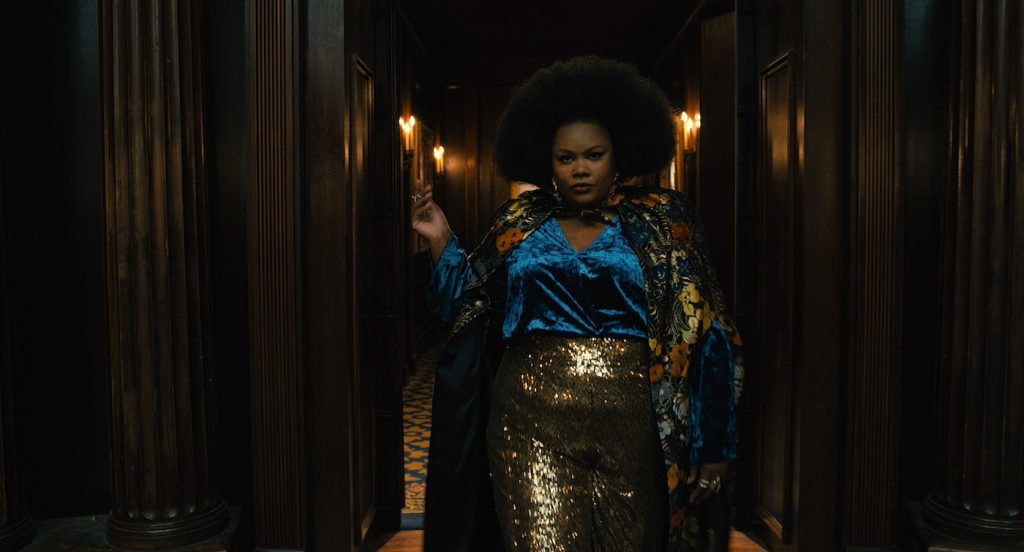
You get to play around with fantasy tropes, too, both in the magic and in the underground lair where the society congregates. It feels like something out of Harry Potter. What were you referencing with the production design?
It’s quite explicitly Harry Potter — the wood-paneled Hogwarts — but the other genre that it falls into is there’s-a-world-beneath-the-world. There’s a quality to that that I’m subverting. Often, in those world-beneath-our-world stories, it’s really a fantasy that there’s a different, better world out there. Harry Potter lives in a closet beneath the stairs. He’s got a bad life, but in this secret society world, he’s the chosen one. Same for Neo in The Matrix. You’re sucked into a world where the protagonist is the one that’s special. When you think about Black fantasy, you think about Wakanda and even blaxploitation movies, which are superhero movies in their own way. There, you’re using powers to be bigger than white supremacy and systemic racism. Part of the stark contrast to a lot of the Black films I just mentioned is, “Hey, this protagonist has a sh*t life, but after he’s sucked into this world, rather than being the prince, he’s actually extra subject to it.” To me, there’s real satire in that subversion because it’s the difference between a Black world-beneath-our-world movie and a white world-beneath-our-world movie: There’s no escaping it. There’s no magical world where racism can’t get you. The consistency of that is heartbreaking and also quite frustrating for audiences that want that pure escape.
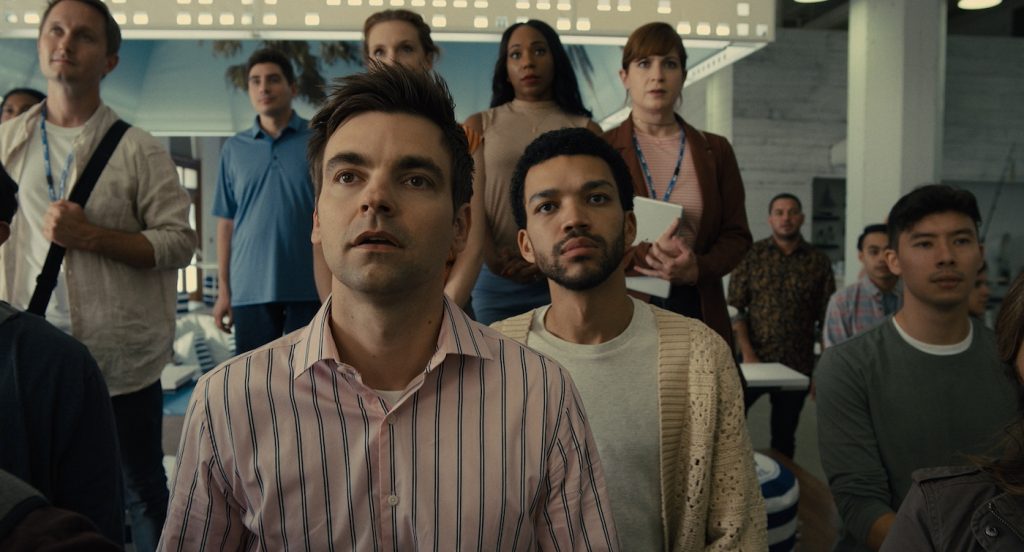
Having Aren work at a social media company — one of these platforms that preaches connection but actually results in disharmony — is also fertile ground for satire. What did that allow you to explore?
Where I was coming from was the work culture of those places and the professed values of those places. There’s very much a language of “bring your whole self to work” in that corporate culture: No, you can express yourself. Don’t cover your tattoos. It’s all good. There is a pretense of inclusion that I’m deeply suspicious of. I liked that as a broader metaphor for some of the false language and false invitations to inclusion that I think America, broadly speaking, is making towards us. After George Floyd, everyone in the corporate sector is using the right language, but the subtext is still there. The medical outcomes for Black women are still there. It’s a performance of inclusion. This is my own fantasy of actually being seen and heard and understood.
For more on Universal Pictures, Peacock, and Focus Features projects, check out these stories:
Legacy Forged: Christopher Nolan & “Oppenheimer” Have Huge Oscars Night
“The Holdovers” Oscar-Nominated Edtior Kevin Tent on Creating a 70s Vibe With Timeless Performances
Featured image: (L to R) Justice Smith as “Aren”, David Alan Grier as “Roger” and Aisha Hinds as “Gabbard” in writer/director Kobi Libii’s THE AMERICAN SOCIETY OF MAGICAL NEGROES, a Focus Features release. Credit: Tobin Yelland / Focus Features



